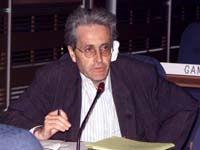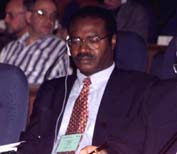|
| Working Group I |
Peter Bridgewater, DIVERSITAS Programme/UNESCO, presented the Global
Taxonomy Initiative (GTI). He stressed the importance of cooperative efforts at national,
regional and international levels and called for new partnerships between the CBD and
other institutions. He recommended that SBSTTA develop criteria and principles for
priority setting processes and provide suggestions for capacity-building. The Secretariat
introduced the Executive Secretary's note on the GTI (UNEP/CBD/SBSTTA/4/6 and Corr.1). DIVERSITAS Programme/UNESCO, presented the Global
Taxonomy Initiative (GTI). He stressed the importance of cooperative efforts at national,
regional and international levels and called for new partnerships between the CBD and
other institutions. He recommended that SBSTTA develop criteria and principles for
priority setting processes and provide suggestions for capacity-building. The Secretariat
introduced the Executive Secretary's note on the GTI (UNEP/CBD/SBSTTA/4/6 and Corr.1). Complete RealAudio of Dr. Bridegewater's presentation:
 Part one: Introduction of the speaker and
the GTI, how many species exist and how many are categorized, what is taxonomy Part one: Introduction of the speaker and
the GTI, how many species exist and how many are categorized, what is taxonomy
 Part two: International and organizational
cooperation issues, capacity-building in taxonomy Part two: International and organizational
cooperation issues, capacity-building in taxonomy
 Part three: Question and answer on the
shrinking financing for taxonomy, problem of political attractiveness and the public
profile of taxonomy, and a non-question from the Chair Part three: Question and answer on the
shrinking financing for taxonomy, problem of political attractiveness and the public
profile of taxonomy, and a non-question from the Chair
|
 |
AUSTRALIA supported identifying framework projects and
suggested educating government policymakers and encouraging them to create permanent
taxonomist positions. |
| Delegates received and discussed the Chair's
draft decision on drylands in the afternoon. Martin Uppenbrink (Germany), Chair of Working
Group I, is pictured here. |
 |
 |
ARGENTINA questioned the call for a liaison group to help
draft the programme of work. |
| Working Group II |
| CANADA, BURUNDI and CÔTE D'IVOIRE
underscored the importance of incorporating traditional indigenous knowledge into EIAs. |
 |
 |
FRANCE said it was essential that assessments be carried
out on policies, plans and strategies; and emphasized transboundary impact assessments. |
| CAMEROON called upon the World Bank to
assist developing countries to finance EIA workshops. |
 |
 |
GERMANY stressed the importance of national legislation
and regulation to protect biodiversity and the need to better define biodiversity EIA. He
also emphasized that biodiversity should be integrated into EIAs rather than separate
biodiversity impact assessments. |
 DIVERSITAS Programme/UNESCO, presented the Global
Taxonomy Initiative (GTI). He stressed the importance of cooperative efforts at national,
regional and international levels and called for new partnerships between the CBD and
other institutions. He recommended that SBSTTA develop criteria and principles for
priority setting processes and provide suggestions for capacity-building. The Secretariat
introduced the Executive Secretary's note on the GTI (UNEP/CBD/SBSTTA/4/6 and Corr.1).
DIVERSITAS Programme/UNESCO, presented the Global
Taxonomy Initiative (GTI). He stressed the importance of cooperative efforts at national,
regional and international levels and called for new partnerships between the CBD and
other institutions. He recommended that SBSTTA develop criteria and principles for
priority setting processes and provide suggestions for capacity-building. The Secretariat
introduced the Executive Secretary's note on the GTI (UNEP/CBD/SBSTTA/4/6 and Corr.1). 






